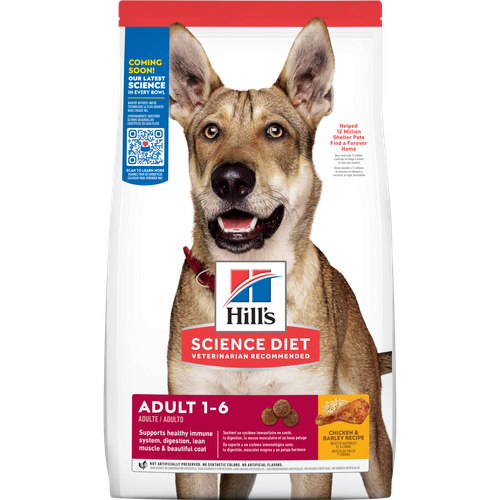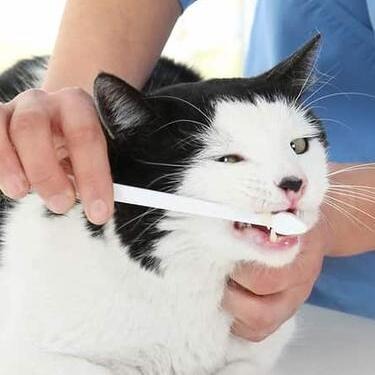
-
Find the right food for your petTake this quiz to see which food may be the best for your furry friend.Find the right food for your petTake this quiz to see which food may be the best for your furry friend.Featured products
 Adult Chicken & Barley Recipe Dog Food
Adult Chicken & Barley Recipe Dog FoodSupports lean muscle and beautiful coat for adult dogs
Shop Now Puppy Lamb Meal & Brown Rice Recipe
Puppy Lamb Meal & Brown Rice RecipeVital nutrients to support 5 essential building blocks for lifelong health
Shop Now Adult Small & Mini Lamb Meal & Brown Rice Recipe Dog Food
Adult Small & Mini Lamb Meal & Brown Rice Recipe Dog FoodFor the faster metabolism of Small & Mini dogs
Shop NowFeatured products Adult Indoor Chicken Recipe Cat Food
Adult Indoor Chicken Recipe Cat FoodSupports energy level and beautiful fur in indoor cats
Shop Now Adult Chicken & Barley Recipe Dog Food
Adult Chicken & Barley Recipe Dog FoodSupports lean muscle and beautiful coat for adult dogs
Shop Now Hill's Science Diet Adult Sensitive Stomach & Skin Chicken Recipe Dog Food
Hill's Science Diet Adult Sensitive Stomach & Skin Chicken Recipe Dog FoodHighly digestible recipe, gentle on stomachs. Nourishes skin & promotes a lustrous coat
Shop Now -
Dog
- Dog Tips & Articles
-
Health Category
- Weight
- Food & Environmental Sensitivities
- Urinary
- Digestive
- Joint
- Kidney
-
Life Stage
- Puppy Nutrition
- Adult Nutrition
- Senior Nutrition
Cat- Cat Tips & Articles
-
Health Category
- Weight
- Skin & Food Sensitivities
- Urinary
- Digestive
- Kidney
-
Life Stage
- Kitten Nutrition
- Adult Nutrition
Featured articles Pet Dental Health: What Happens During a Deep Teeth Cleaning?
Pet Dental Health: What Happens During a Deep Teeth Cleaning?Learn about veterinary dental care for your pet, including deep teeth cleaning procedures, which can help your dog or cat maintain proper dental health.
Read More My Pet Ate a Lizard — What Should I Do?
My Pet Ate a Lizard — What Should I Do?Learn what to do if your pet eats a lizard, including whether they can be toxic and symptoms to keep an eye on when they've swallowed one.
Read More Virtual Vet Visits: What You Need to Know
Virtual Vet Visits: What You Need to KnowLearn the ins and outs of a televet appointment before you talk to a vet online.
Read More -


It's the holiday season, which means you'll likely soon find yourself surrounded by all kinds of festive sweets. If you have a sweet tooth, this is probably your favorite time of year — but if you have a curious pup who likes to join in on holiday fun, it can also be a stressful time. If you have a dog in the home around the holidays you might find yourself fretting over questions like, "Is peppermint safe for dogs?" or "Can dogs eat marshmallows?" Read on to learn more about different holidays sweets and any dangers they might pose to your furry best friend.
Dangers of Holiday Sweets for Dogs
As a general rule, you should keep sweets out of your dog's reach at all times. According to the ASPCA, if your dog eats candy that's high in sugar, it can cause vomiting and diarrhea. Sugar is also contains empty calories (meaning they provide no nutritional benefits), which can lead to extra calories and weight-related health conditions such as obesity. Sugar-free treats are off-limits, too. Sugar-free candies often contain xylitol, a sweetener that, if consumed by dogs, can lead to low blood sugar and liver disease. Be sure to read nutrition labels before sharing anything with your dog so you can ensure what you're giving them isn't potentially toxic.
Here's why it's important to keep your pet away from some of the most popular sweet treats during your holiday festivities.

Chocolate
Chocolate is notoriously dangerous for dogs. If you think your dog might've eaten chocolate, the ASPCA advises to keep an eye out for vomiting, diarrhea, excessive drinking, hyperactivity, pacing and shaking. If you see any of these signs, bring your dog to the veterinarian as soon as possible.
If your dog seems to be behaving normally, the ASPCA recommends gathering information about the type of chocolate and its ingredients you think your pet ate (i.e., dark or cooking chocolate vs. milk chocolate), then calling your vet to ask for advice and next steps.
Peppermint
Candy canes, starlight mints, peppermint bark... Peppermint is practically everywhere once the winter months roll around. But is peppermint safe for dogs? Quite the opposite: Peppermint is extremely dangerous for your pet. According to the ASPCA, eating peppermint can cause vomiting and diarrhea, among other reactions.
Peppermint candies also present the additional danger of wrappers. The plastic wrappers on many of these candies can get stuck in the digestive tract and cause a blockage, which can be life threatening.
If you think your dog consumed peppermint or the wrapper, call your vet right away.
Marshmallows
Fluffy, gooey marshmallows might seem innocent, but these treats are never OK for your pet to eat. Like peppermint treats, sugar-free marshmallows contain xylitol, which is toxic to dogs. If you think your pooch might've gotten into a bag of sugar-free marshmallows, the American Kennel Club (AKC) suggests you look out for vomiting, lack of appetite or diarrhea. It's important to catch these signs quickly. If they continue for more than one or two days, says the AKC, your dog could be at risk of pancreatitis. While traditional marshmallows don't contain xylitol, they do contain large amounts of sugar, which again are unhealthy for your dog to eat.


Tasty Tips
Other Holiday Treats
Every culture and household has its own tradition when it comes to celebrating the holidays with treats. Always make sure to think about your dog before putting any food-related items within reach of your pup's curious nose.
Holiday traditions such as decorating a tree with candy canes or popcorn should be avoided with a dog in the household. In addition to the above mentioned dangers, consuming more than 8-10% of your dog's daily calories from non-dog food items can put on unwanted pounds on your dog that can lead to other health problems.
When baking holidays sweets like cookies, it is often best to keep your dog out of the kitchen. It's not just the sugary treats and extra calories you have to worry about. Consider all of the additional ingredients you have within your dog's reach (such as nutmeg and cinnamon that can cause toxicity in dogs if consumed in large amounts), not to mention a potentially hot stove. Additionally, if you're planning on leaving out milk and cookies out for Santa, make sure your dog does not have access to them.
Also, consider placing any sweet-smelling candles out of your dog's reach, as your dog's nose is far more important to their sense of taste than their taste buds. Essential oils can fall into this camp as well. Wintergreen and pine and peppermint essential oils in diffusers and mists can be toxic to dogs says the Pet Poison Helpline.
The holidays are a wonderful time of year, not least for the scrumptious sweets you get to enjoy. But for dogs, holidays can be dangerous if pet parents aren't careful. Be sure to keep human treats out of the reach of your four-legged friends this season, and help them share in the holiday cheer with safe dog biscuits and toys instead.


Erin Ollila believes in the power of words and how a message can inform—and even transform—its intended audience. Her writing can be found all over the internet and in print, and includes interviews, ghostwriting, blog posts, and creative nonfiction. Erin is a geek for SEO and all things social media. She graduated from Fairfield University with an M.F.A. in Creative Writing. Reach out to her on Twitter @ReinventingErin or learn more about her at http://erinollila.com.
Related products

Supports lean muscle and beautiful coat for adult dogs

Vital nutrients to support 5 essential building blocks for lifelong health

Supports energy level and beautiful coat in mature dogs who prefer smaller kibble

For the faster metabolism of Small & Mini dogs
Related articles

Your dog's coat and skin are a big part of your dog's overall health. Ensure you keep your dog's coat healthy, by following these simple tips.

Proper nutrition for your pregnant or nursing dog is vital to her and her puppy's health. Learn what you should do provide her with the proper nutrients.

Learn about Hill's puppy food and the nutritional benefit & high quality ingredients that it contains for your pup.

Discover how the field of dog science is giving us more and more insights into the inner workings of our furry best friends.

Put your dog on a diet without them knowing
Our low calorie formula helps you control your dog's weight. It's packed with high-quality protein for building lean muscles, and made with purposeful ingredients for a flavorful, nutritious meal. Clinically proven antioxidants, Vitamin C+E, help promote a healthy immune system.
Put your dog on a diet without them knowing
Our low calorie formula helps you control your dog's weight. It's packed with high-quality protein for building lean muscles, and made with purposeful ingredients for a flavorful, nutritious meal. Clinically proven antioxidants, Vitamin C+E, help promote a healthy immune system.

